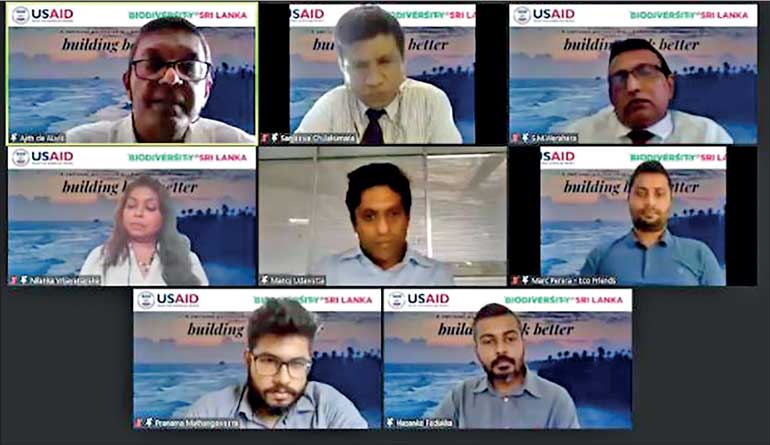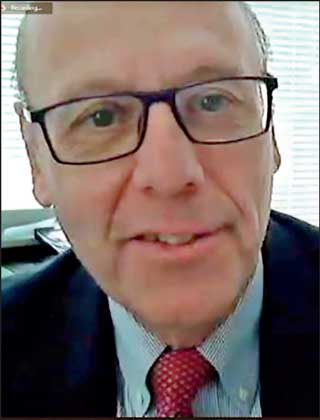Sunday Feb 15, 2026
Sunday Feb 15, 2026
Friday, 22 October 2021 00:00 - - {{hitsCtrl.values.hits}}

Panel discussion
Biodiversity Sri Lanka (BSL) successfully concluded a technical session on SOS (Save our Seas): Saving Oceans
 |
| USAID Sri Lanka and Maldives Mission Director Reed Aeschliman |
 |
| Biodiversity Sri Lanka Program Manager Roshan Salinda |
from Plastics, as a part of its sixth Annual Technical Sessions, in partnership with the Ceylon Chamber of Commerce (CCC) and the US Agency for International Development’s Clean Cities Blue Ocean (USAID CCBO) program.
The aim of these consecutive annual sessions was to facilitate partnerships for the fulfilment of Extended Producer Responsibilities (EPR) – an approach in which producers are engaged in the full waste cycle and accept significant responsibility for the environmentally conscious disposal of their products – among plastic users. The theme of the three consecutive annual sessions was Business for Biodiversity – building back better.
More than 80 participants, a majority of whom were from the private sector, participated in the session which raised awareness on collection and recycling solutions available for plastic waste. At the event, key parties agreed to work together in tackling the plastic waste issue and supporting the national EPR dialogue. Overall, the event yielded extremely valuable insights on the future direction of plastic waste management in the country and was considered a significant step forward in bringing EPR to fruition in Sri Lanka.
Chandrarathna D. Vithanage, Director, Biodiversity Sri Lanka and Senior Assistant Secretary General, Ceylon Chamber of Commerce who is also the Manager of the CCBO – CCC EPR Pilot Project opening the session elaborated on the history and present developments of EPR in Sri Lanka. He explained that CCC and BSL have established two consortia, targeting highly used, two types of plastics: PET and HIPS, to support EPR implementation in the country at a pilot scale. Since the success of EPR is highly dependent on increasing plastic waste collection volumes, deliberations on plastic waste collection solutions and gaps are of immense importance to plastic users, as moves are underway to mandate annual collect back targets based on plastics utilised by users.
USAID Sri Lanka and Maldives Mission Director Reed Aeschliman welcomed the participants and stressed the timeliness and importance of BSL’s sessions. He stated: “EPR encourages collaboration between public and private sectors to transition from the ‘take, make, waste’ economic model to a model in which products are regenerative by design. By adhering to the EPR Roadmap, we can collectively reimagine how we produce, manage, and dispose of waste, and treat waste as a resource that creates opportunities for better livelihoods.”
Launching the technical proceedings, BSL Program Manager Roshan Salinda presented an overview on EPR implementation modalities, the plastic waste collection ecosystem in Sri Lanka including a classification of actors and facilities available, and gaps and challenges in plastic waste collection, raising the question, can EPR be a game-changer for plastic waste management in Sri Lanka? Illustrative case-studies presented by three characteristically different plastic waste collection service providers: Zero Trash, Eco Friends and Abans Cleantech followed.
Zero Trash Founder Hasanka Padukka stated that his organization offers plastic waste drop-off facilities, collection of plastic waste in a network of bins for companies, as well as subscription-based on demand collection services. Eco Friends is a mobile based platform that provides the services of collecting recyclable waste from households/corporates.
Eco Friends Founder and CEO Marc Perera elaborated that Eco Friends offers an attractive reward scheme - ‘Eco Points’ for households based on their waste contributions, the points of which can be redeemed after six months. Abans Cleantech is one of the largest waste collection service providers in Sri Lanka.
Circular Economy Services Division Mechanical Engineer Pranama Mathangaweera highlighted that a range of plastic waste is collected, including ABS, PET, HIPS and PP. He further elaborated that Cleantech follows a five-step process in dealing with plastic waste: Collection, Manual Sorting, Crushing and Shedding, Sieving and Pelletising.
A lively panel discussion on the theme ‘Recycling Solutions for EPR: Current Capacity and Gaps’ ably moderated by Prof. Ajith de Alwis, Senior Professor, Department of Chemical and Process Engineering, University of Moratuwa followed.
Ministry of Environment Pollution Control and Chemical Management Unit Director S.M. Werahara, Insee Ecocycle Ltd. General Manager Sanjeewa Chulakumara, Eco Spindles CEO Manoj Udawatte and Blue Ocean USAID Clean Cities Sri Lanka and Maldives Country Director Nilanka Wijayanayake elaborated their mandate and role in tackling the plastic waste issue in Sri Lanka from their organisational perspectives.
In responding to a question on policy consistency and industry’s commitment, Werahara indicated that Sri Lanka has a Plastic Waste Management Action Plan and EPR Roadmap which will be the basis in determining the government’s policy direction in addressing plastic waste issues in the future.
Explaining Insee Ecocycle’s business proposition, Chulakumara emphasised that recyclable material will not be combusted in their cement kiln, and that Insee’s business model is based on the premise of providing a sustainable solution for effective plastic waste management in Sri Lanka.
Udawatte stated that Eco Spindles firmly believes in utilizing best globally available recycling technologies. In reply to a question on Material Recovery Facilities (MRFs), he explained that the purpose of setting up MRFs is to develop district-wide networks to collect all types of plastic waste, highlighting that MRFs can play a defining role in ensuring best prices for plastic waste, collected by both formal and informal collectors.
On the question of future USAID Clean Cities, Blue Ocean activities, Wijayanayake underscored that the program is fully committed to support the realisation of goals in the National Action Plan for Plastic Waste Management in Sri Lanka and the implementation of the EPR Road Map. She further explained that among the areas that CCBO will work on are supporting the drafting of national regulations targeting the management of non-hazardous waste, piloting innovative schemes and systems for plastic waste management, and addressing gaps in local collection and aggregation frameworks through technical assistance and its local grants program.
In conclusion, panellists pledged their support in materialising plastic waste management objectives of the country based on the principles of reduce, reuse, and recycling through support from the corporates, enhancing collaborative approaches and by forging public-private-community partnerships.